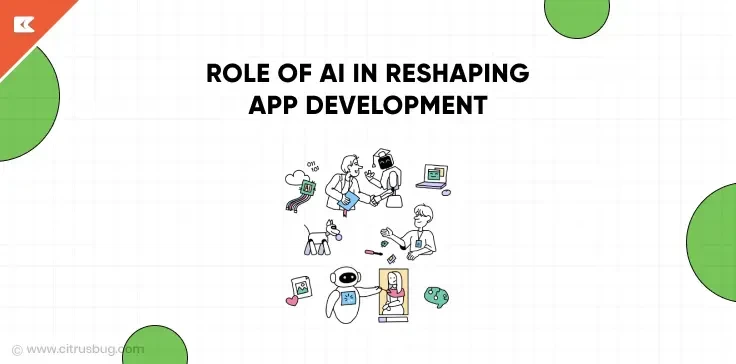Role of AI in reshaping App Development: Impacts & Benefits
- July 26, 2024
-
3118 Views
- by Ishan Vyas

Understanding AI Technology
Artificial intelligence is an innovation that recreates the human intelligence processes in software distributions or computer frameworks to perform undertakings. It enables machines or software applications to adapt to new inputs, learn from past experiences, and perform human-like tasks. Natural language processing, speech recognition, predictive analysis, and machine vision are just a few of its many features. This innovation is the mix of deep learning, computer vision, and AI that give a framework with automated and self thinking skills.
Artificial intelligence tools for application development are not simply innovations; they are changing the way that organizations work, improving client encounters, and smoothing out tasks. This is why entrepreneurs look forward to implementing AI in mobile app development
The Influence of AI on Mobile App Development
AI in app development is basically the process of utilizing the capabilities of artificial intelligence to build mobile applications. It includes conceptualization, plan, programming, and creating AI and ML-powered highlights that are unrealistic with existing or traditional technologies.
In mobile applications, developers use AI algorithms to build intelligent functionality and innovative features. Advanced capabilities in AI-powered mobile apps enable them to adapt to various requirements and make decisions based on real-time data.
The primary goal of using AI in mobile applications is to improve user comfort and solve their day-to-day issues. AI can use mobile phone data like location, contacts, and daily actions to improve user engagement and find solutions to complex problems.Thanks to AI tools for app development, apps now have the ability to adapt to user behaviors, anticipate user needs, and provide tailored content that engages users more effectively.
Benefits of AI in App Development
There is a lot of demand for AI-powered mobile apps that let users edit faces, use voice recognition, learn languages, and more. Popular AI-based mobile apps on the market today include Google Assistant, Amazon Alexa, Replika, FaceApp, ELSA, SnapChat, Socratic, Duolingo, and Lensa. These apps provide users with numerous innovative features.
Today, startups seek partnerships with leading mobile app development companies to develop AI-powered business-oriented mobile applications. So, why is AI being used more and more in mobile app development? Here are the reasons:
High-End Security
Cybercrime is expected to cost $23.72 trillion in 2027, up from $8.44 trillion in 2022. These numbers give you good reason to invest heavily in making your company’s cybersecurity better. AI is able to detect anomalies and issue alerts by analyzing transaction patterns. This safeguards users from potential financial fraud and maintains their trust in the app.
Mobile app developers can use AI and ML to enable automated security features and deploy smart ML models in custom apps. Apps powered by AI and ML are capable of accurately detecting and preventing fraudulent activity within the app. In addition to protecting user data, this also fosters trust and provides a safe environment in which users can interact with the app.
Enhanced User Experience
AI acts as a personalization engine. Thanks to artificial intelligence (AI), mobile apps can now offer personalized recommendations and suggestions based on each user’s data, such as their browsing history or previous purchases.
Artificial intelligence can significantly boost user engagement by adding intuitive highlights, for example, chatbots or virtual assistants. AI-driven chatbots are used in customer service apps like Domino’s to interact with users, provide immediate responses, and provide personalized recommendations.
Data-driven Content
Content plays a crucial role when it comes to the performance of mobile applications. AI-powered custom applications can gather client information more proficiently. Therefore, custom apps give app owners the ability to make informed decisions based on real-time insights with this data. As a result, it encourages a development process that is both more effective and optimized.
In addition, AI contributes to expanding the app’s global reach by translating content and converting images using optical character recognition (OCR).
Predictive Intelligence
One of the most important AI and ML capabilities is predictive analytics. It makes it possible for mobile applications to intelligently collect user data and provide offers that are personalized or customized. When artificial intelligence (AI) is used in app development, mobile apps have improved capabilities for closely observing customer behavior patterns and catering to their specific needs. Subsequently, it helps versatile applications to draw in clients and hence further improve conversion rates.
Effective Communication
AI Chatbots assist with smoothing out communication between the apps and the client. Chatbots are developing the ability to recognize and imitate human-like emotions using artificial intelligence technology.
Chatbots are becoming more common in online interactions with mobile applications and websites. Because of the presentation of AI, interaction with chatbots will become like speaking with a genuine expert in a normal store.
Generative AI’s Impact on Application Development
Generative AI Teck stack makes the learning curve for new developers easier, making it easier for them to quickly get used to new technologies. Generative AI has the stage for changing the way in which we compose content, plan, create, and animate. We have been continually seeing the utilization of AI in different industry verticals.
Generative AI is a modern app development technique that goes beyond the traditional AI process by creating human-like content.
The eventual fate of app development with Generative AI presents both exciting opportunities and critical difficulties, requiring another range of abilities and attitude from developers. To stay ahead in this evolving landscape, businesses are now shifting towards future-ready app development that leverages AI to deliver intelligent, scalable, and personalized mobile experiences.
Real-world Scenarios of Generative AI
Instead of replacing developers, generative AI is likely to become an essential component of their toolbox, allowing them to concentrate on app development’s more creative and intricate aspects. The meaning of ongoing education and lifelong learning couldn’t possibly be more significant in assisting people with adjusting to the developing scene of artificial intelligence. With the rise of edtech trends, learning has become more accessible, offering innovative ways to stay updated with advancing AI technologies. Success in the field relies on the ability to keep up and proficient in these evolving tools.
The transformative capacities of generative AI are exhibited by devices like ChatGPT and Bard, which produce text or pictures in view of various creative ideas. It’s like having your very own genie in a bottle who is always there to fulfill your creative wishes. While there is opportunity to get better, what’s in store seems promising for generative AI.
Well Known Examples of AI Apps in 2024
ChatGPT
A leader in the chatbot space, ChatGPT can converse with clients, answer given questions and produce new text. A lot of people make use of ChatGPT to write articles, emails, scripts, essays, and code.
Ask AI
Ask AI is able to write outlines and other new content based on text prompts, answer user questions, and chat with users thanks to the ChatGPT API and GPT-4. Ask AI can converse in multiple languages about a wide range of topics, including business and entertainment.
Smartly
With a focus on creating technology for digital marketing, Smartly offers an AI-powered advertising platform that covers imaginative creation, campaign launch and the management and performance estimation.
Alexa
The sophisticated natural language processing capabilities of Amazon’s Alexa enable it to not only understand spoken language but also to generate it through fluent user conversations. The Alexa app can also be paired with other smart devices to allow users to control smart thermostats, wearables, televisions, and even cars directly from their phones.
Siri
Launched in 2011, Siri is widely regarded as the first virtual assistant. The app can do everything from send text messages to find a song that’s playing by using voice queries and a user interface that speaks natural language. It can also change over time to fit a user’s language, searches, and preferences.
Duolingo
Duolingo provides exercises for listening, reading, and speaking in dozens of global languages while also incorporating aspects of gamification to retain users.
Youper
Youper has an AI chatbot that focuses on mental health. This chatbot talks to users about their emotional struggles and gives them tailored strategies for coping. A mood tracker, personality tests, a selection of mindfulness exercises, and other features are also included in the app.
Google Maps
Google Maps totals location information from cell phones, as well as client reported data on things like construction and car accidents to screen the recurring pattern of traffic, decide an estimated time of arrival and provide users with the quickest route to their ideal destination.
Challenges and Considerations in AI-Infused Mobile App Development
Adding an AI model to your app is only one part of AI app development. It also means making sure it integrates well with your current platforms and systems. There are many advantages to incorporating Artificial Intelligence (AI) into mobile applications, but there are also a few challenges. When implementing AI in mobile app development, businesses must be aware of these typical obstacles.
Data Quality and Availability
Accessing relevant, high-quality data can be difficult because AI relies on it. For AI to be successful, it is essential to guarantee the consistency, quality, and availability of data.
Privacy and Security
Concerns about privacy arise when user data are collected and used for AI. To gain users’ trust, businesses must place a high priority on data security and privacy regulations compliance.
Resource Requirements
AI can be resource-intensive, both regarding computational power and skilled personnel. Organizations should make financial plans for the vital resources and expertise.
Scalability
AI systems must scale to accommodate increased demand as the user base expands. If they are not anticipated in advance, scalability issues may arise.
Testing and Validation
To guarantee that AI works as intended, rigorous testing is required. Creating complete testing procedures for AI driven features is fundamental to avoid glitches or blunders.
Cost Management
Although AI has advantages in the long run, its initial costs can be high. Effective budget management is necessary for businesses to ensure a positive return on investment.
Navigating these difficulties requires an essential methodology, talented assets, and a commitment to keeping up with data protection and security. Businesses wishing to successfully utilize AI’s potential in app development must overcome these obstacles.
Conclusion
AI app development is the best way to create a game-changing app and enhance an existing one. You will be able to create an engaging app and better meet user needs with AI. As AI is used in mobile application development, it helps developers and businesses create feature-rich, high-performance applications.
However, due to the high level of expertise required, developing AI-powered apps may be a difficult task for entrepreneurs and startups. Therefore, working with a reputable AI mobile app development company that can assist you in developing an AI-powered mobile application for your business model is a smart move.





 SaaS Development
SaaS Development Web Application Development
Web Application Development Mobile Application Development
Mobile Application Development Custom Software Development
Custom Software Development Cloud Development
Cloud Development DevOps Development
DevOps Development MVP Development
MVP Development Digital Product Development
Digital Product Development Hire Chatbot Developers
Hire Chatbot Developers Hire Python Developers
Hire Python Developers Hire Django Developers
Hire Django Developers Hire ReactJS Developers
Hire ReactJS Developers Hire AngularJS Developers
Hire AngularJS Developers Hire VueJS Developers
Hire VueJS Developers Hire Full Stack Developers
Hire Full Stack Developers Hire Back End Developers
Hire Back End Developers Hire Front End Developers
Hire Front End Developers AI Healthcare Software Development & Consulting
AI Healthcare Software Development & Consulting Healthcare App Development
Healthcare App Development EHR Software Development
EHR Software Development Healthcare AI Chatbot Development
Healthcare AI Chatbot Development Telemedicine App Development Company
Telemedicine App Development Company Medical Billing Software Development
Medical Billing Software Development Fitness App Development
Fitness App Development RPM Software Development
RPM Software Development Medicine Delivery App Development
Medicine Delivery App Development Medical Device Software Development
Medical Device Software Development Patient Engagement Software Solutions
Patient Engagement Software Solutions Mental Health App Development
Mental Health App Development Healthcare IT Consulting
Healthcare IT Consulting Healthcare CRM Software Development
Healthcare CRM Software Development Healthcare IT Managed Services
Healthcare IT Managed Services Healthcare Software Testing services
Healthcare Software Testing services Medical Practice Management Software
Medical Practice Management Software Outsourcing Healthcare IT Services
Outsourcing Healthcare IT Services IoT Solutions for Healthcare
IoT Solutions for Healthcare Medical Image Analysis Software Development Services
Medical Image Analysis Software Development Services Lending Software Development Services
Lending Software Development Services Payment Gateway Software Development
Payment Gateway Software Development Accounting Software Development
Accounting Software Development AI-Driven Banking App Development
AI-Driven Banking App Development Insurance Software Development
Insurance Software Development Finance Software Development
Finance Software Development Loan Management Software Development
Loan Management Software Development Decentralized Finance Development Services
Decentralized Finance Development Services eWallet App Development
eWallet App Development Payment App Development
Payment App Development Money Transfer App Development
Money Transfer App Development Mortgage Software Development
Mortgage Software Development Insurance Fraud Detection Software Development
Insurance Fraud Detection Software Development Wealth Management Software Development
Wealth Management Software Development Cryptocurrency Exchange Platform Development
Cryptocurrency Exchange Platform Development Neobank App Development
Neobank App Development Stock Trading App Development
Stock Trading App Development AML software Development
AML software Development Web3 Wallet Development
Web3 Wallet Development Robo-Advisor App Development
Robo-Advisor App Development Supply Chain Management Software Development
Supply Chain Management Software Development Fleet Management Software Development
Fleet Management Software Development Warehouse Management Software Development
Warehouse Management Software Development LMS Development
LMS Development Education App Development
Education App Development Inventory Management Software Development
Inventory Management Software Development Property Management Software Development
Property Management Software Development Real Estate CRM Software Development
Real Estate CRM Software Development Real Estate Document Management Software
Real Estate Document Management Software Construction App Development
Construction App Development Construction ERP Software Development
Construction ERP Software Development







